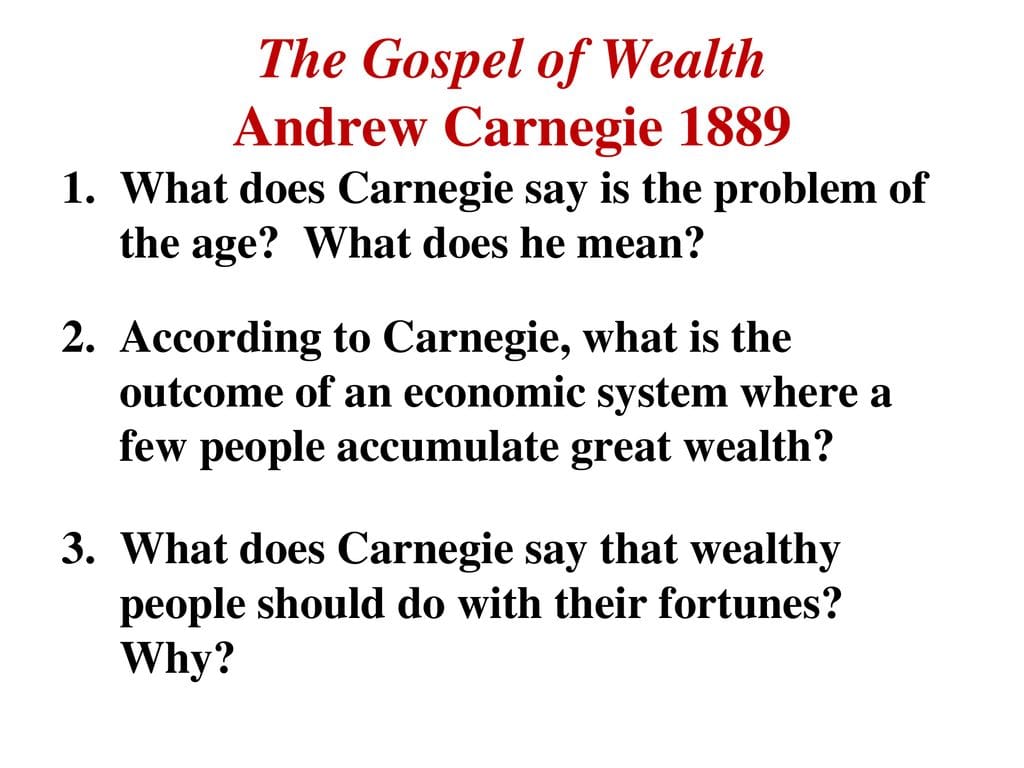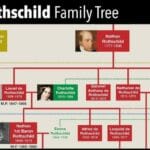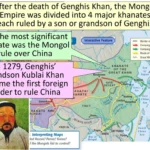Andrew Carnegie’s “Gospel of Wealth” ignited a debate still raging today: Does immense wealth obligate the rich to become benevolent philanthropists, or does it mask systemic inequality? Published in 1889, “The Gospel of Wealth” urged self-made millionaires to become responsible stewards of their fortunes, advocating for strategic philanthropy over inherited wealth. Carnegie’s philosophy fueled a golden age of philanthropy, building libraries, universities, and cultural institutions, yet critics argue it perpetuates a system where the wealthy dictate social good. Explore the full text, historical context, and enduring legacy of “The Gospel of Wealth”—a philosophical treatise that continues to shape debates on wealth, responsibility, and social justice.
The Genesis of the Gospel
The late 19th century, a period marked by the rapid industrialization and burgeoning fortunes of robber barons, provided the backdrop for Andrew Carnegie’s “Gospel of Wealth.” Amidst the widening gap between the rich and the poor, Carnegie, a steel magnate who had amassed an enormous fortune, penned his treatise in North American Review in June 1889, originally titled simply “Wealth.” This essay outlined his philosophy on wealth accumulation and its ethical distribution, a perspective likely shaped by the prevailing ideology of Social Darwinism, which Carnegie sought to challenge by advocating for social responsibility alongside the “law of competition.”
The Core Tenets of Carnegie’s Philosophy
Carnegie’s “Gospel of Wealth” rests upon several key pillars:
Individual Responsibility and the Duty of the Wealthy
Carnegie posited that while the “law of competition” fueled progress, it also placed a heavy burden on those who accumulated great wealth. He believed that the wealthy served as “trustees” of their fortunes, obligated to administer their excess riches for the benefit of society. This concept of stewardship, central to his philosophy, suggested that vast wealth was not simply for personal enjoyment but a resource to be managed for the common good.
Strategic Philanthropy: A Legacy of Impact
Carnegie championed strategic philanthropy, emphasizing carefully planned giving to maximize positive social impact. He advocated for investments in public institutions like libraries (evidenced by the establishment of over 2,500 libraries worldwide), education (manifested in the founding of Carnegie Mellon University and the Carnegie Institution for Science), and the arts (exemplified by his support of organizations like Carnegie Hall). He believed such investments provided opportunities for self-improvement and community uplift, offering a “hand up, not a handout.”
The Perils of Inherited Wealth
A staunch critic of inherited wealth, Carnegie argued that large inheritances fostered idleness and hindered the development of future generations. He proposed modest inheritances, suggesting that the bulk of a fortune should be actively distributed by its earner for the betterment of society. This belief likely stemmed from his own experience as a self-made man and a conviction that earned wealth carried a different weight of responsibility.
Individual Giving vs. Government Redistribution
Carnegie favored individual giving over government redistribution, arguing that private philanthropy was more effective and efficient in addressing social issues. He believed that individuals were better positioned to understand community needs and allocate resources accordingly. This perspective may have been influenced by the limited scope of government social programs at the time and a prevailing distrust of government intervention in private affairs.
A Contested Legacy: Praise and Criticism
“The Gospel of Wealth” ushered in a “golden age of philanthropy,” inspiring other industrialists to contribute vast sums to social causes. However, Carnegie’s philosophy was not without its detractors.
Addressing Symptoms, Not Causes
Critics argued that philanthropy served as a “band-aid solution,” addressing the symptoms of inequality without tackling the root causes. They contended that it allowed the wealthy to maintain control, dictate social priorities, and avoid systemic change. This critique raises questions about the power dynamics inherent in philanthropic endeavors and the potential for biased resource allocation.
Accountability and the Concentration of Power
The question of who decides what constitutes “social good” remains a central critique of Carnegie’s model. Placing such power in the hands of the wealthy raises concerns about their biases, priorities, and potential for self-serving motives. While Carnegie’s philanthropy undoubtedly had a positive impact, it also sparked a debate about accountability and the potential for unchecked influence by a privileged few.
The Labor Question and the Source of Wealth
Carnegie’s legacy is further complicated by his labor practices. While advocating for social uplift, he simultaneously suppressed unions and maintained harsh working conditions in his steel mills. Critics argue that his philanthropy may have been a way to appease his conscience, enhance his public image, or deflect criticism from his business practices. This tension between his philanthropic endeavors and the source of his wealth fuels ongoing debate about his true motivations.
The Enduring Relevance of the Gospel
Despite the criticisms, “The Gospel of Wealth” continues to resonate in contemporary discussions about wealth inequality and social responsibility. The actions of modern billionaires, like Bill Gates and Warren Buffet, who have embraced strategic philanthropy, echo Carnegie’s principles, while ongoing debates about taxation and the role of the wealthy in society reflect the unresolved tensions inherent in his philosophy. “The Gospel of Wealth” serves as a historical touchstone, prompting ongoing discussion about the obligations of the wealthy, the limits of philanthropy, and the pursuit of a more just and equitable society. Further research continues to explore these complex issues, offering new perspectives on Carnegie’s legacy and its implications for the 21st century.
- Unlock Filipino Culture: A Deep Dive into Traditions and Practices - April 23, 2025
- Unlock Spanish Culture: Insights & Opportunities Now - April 23, 2025
- White Spirit Uses & Substitutes: A Deep Dive for Pros & DIYers - April 23, 2025
















